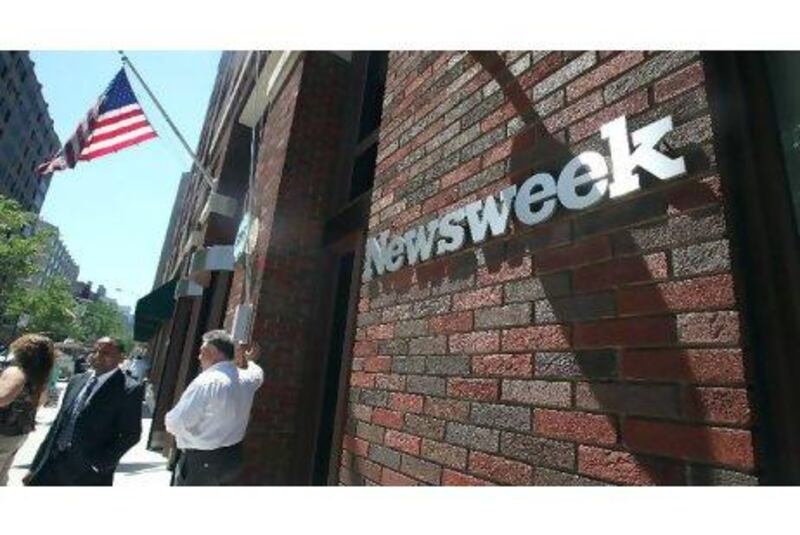For 77 years, Newsweek was renowned for the way it covered and commented on the news. Now, it is making news after merging with a website as it struggles to survive
Ever since Sidney Harman, a 92-year-old audio equipment mogul, bought Newsweek from the Washington Post Company back in August for the grand sum of US$1 (Dh3.67), the publication has been in an even greater state of flux.
Mr Harman could not find a new editor to take the helm, probably because no editor wanted to be lumbered with the task of transforming a magazine with $70 million in liabilities into a viable enterprise.
And there were further causes for concern. At the time of the purchase, Mr Harman said he intended to keep most of Newsweek's staff and keep the magazine on the same editorial track.
Compare this to when Bloomberg bought BusinessWeek last October, another magazine that was struggling under a huge debt load. The company immediately started slashing BusinessWeek's costs and staff, and began integrating the loss-making magazine into its own platform to turn its fortunes around.
Even with a new owner, how long could Newsweek, a publication that was already being trounced by weekly competitors such as Time and The Economist, continue to lose nearly $30m a year and survive?
Now that Newsweek has agreed to a 50-50 merger with The Daily Beast, a news and commentary site edited by Tina Brown and owned by Barry Diller's IAC Corp, it looks like it has embraced the sort of radical structural change necessary to give it a chance.
The new company, which will be called Newsweek Daily Beast Company, with Brown as editor-in-chief, could benefit from newly revitalised web and print offerings, and with any luck, a new clutch of web and print advertising.
However, Brown's approach to making this hybrid beast into a viable enterprise is more questionable. She has already said The Daily Beast will operate much as it is already, and that her attentions will be focused on reviving the magazine part of the business. No one has ever tried to bolt a two-year-old web platform on to a loss-making 77-year-old magazine before, so who knows whether that strategy will work.
What she says she brings from her experience running The Daily Beast is a new perspective on the value of web media and the value of print media and how they can be best combined.
"Today, we look at print from the refreshed point of view of an expatriate who sees the old country with new eyes," Brown said as she announced the deal in a post on The Daily Beast last week. "That will create a great new creative energy."
She thinks the merger will offer "a superb dual marketing platform". She believes Newsweek will offer The Daily Beast a new medium to develop investigations that require "a different narrative pace", while The Daily Beast will raise the profile of Newsweek's bylines. But she could just as easily dilute the magazine's ability to produce decent long-form articles and lose web readers in the transition.
There is also the question of whether the 57-year-old is the right sort of person to pull the magazine out of a hole on a shoestring, given that her glory days as a magazine editor were spent at the New Yorker and Vanity Fair in the 1980s and 1990s with access to huge editorial budgets to produce lavish publications.
Nor have her more recent ventures provided much indication that she is a strong entrepreneurial spirit. Her efforts to set up her own Talk Magazine failed in 2002 when advertising dried up, and although The Daily Beast has grown in influence and stature since she founded it two years ago, it is hardly a huge money maker.
Either way, Brown has to turn Newsweek around quickly enough to confound doubters, who think the flailing print magazine will just take the rest of the company down with it.
Or in the words of one sceptic on The Beast's website, morph The Daily Beast into The Weekly Bust.





